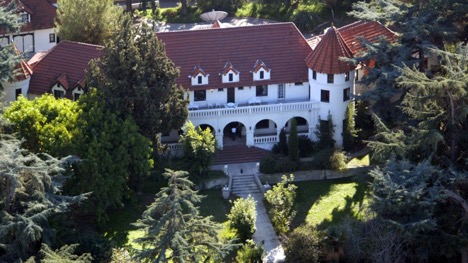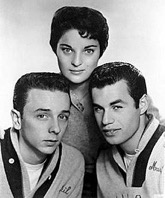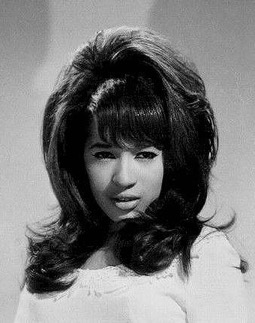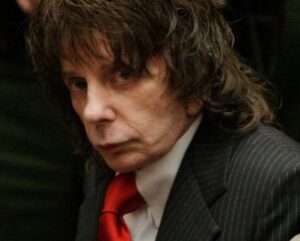The Boy Genius
 Fifteen years ago Cindy and I were having breakfast at The Colonial Kitchen in San Marino when a short bone-thin older man with curly brown hair that fell to his shoulders and a pasty face stretched tight by too much plastic surgery led a stunningly beautiful young Asian woman wearing skin-tight black leather pants and high-heeled boots across the dining room to a booth directly across from us. He sat down and scooted over against the wall. She sat beside him, put her arm around him, nibbled his ear, and rubbed his sunken chest while he ignored her and looked over the menu.
Fifteen years ago Cindy and I were having breakfast at The Colonial Kitchen in San Marino when a short bone-thin older man with curly brown hair that fell to his shoulders and a pasty face stretched tight by too much plastic surgery led a stunningly beautiful young Asian woman wearing skin-tight black leather pants and high-heeled boots across the dining room to a booth directly across from us. He sat down and scooted over against the wall. She sat beside him, put her arm around him, nibbled his ear, and rubbed his sunken chest while he ignored her and looked over the menu.
“Phil Spector just walked in,” I said to Cindy.

Cindy’s pretty hazel eyes widened. She turned to look and we both stared at him.
When you live in LA, you see a lot of celebrities. We stood on the sidewalk with Jack Palance one night in Hancock Park and watched a duplex burn to the ground. Lee Marvin shopped beside us in a department store on Wilshire Boulevard. Elton John sat three tables away at L’Orangerie. The novelty wears off after a while, and you learn to respect their privacy. You take a quick look and move on. You never stare.
That sighting of Phil Spector was different, though. He was a globally famous multi-millionaire music producer facing a murder trial. The indictment alleged he shot a young woman late at night at his home, The Pyrenees Castle, a sprawling mansion located on a hill just a stone’s throw from The Colonial Kitchen, where we sat that morning.

The news reports said his behavior became unpredictable and violent decades earlier when his career began to falter. His first song was a mega-hit way back in 1958 when he was only 19. He wrote, arranged, played guitar, sang, and produced To Know Him is to Love Him with the group, The Teddy Bears. It soared to number one on the charts and remained a top hit for six months, selling over two and a half million copies. The Teddy Bears broke up. Spector moved behind the scenes as a producer and released a dazzling string of hits in the early 1960’s. Dream Lover, Da Doo Ron Ron, Then He Kissed Me, Be My Baby, I Love the Way You Love Me. By the time he was 26, he had produced more than two dozen songs that made the Billboard Top 40, most of them characterized by his signature “wall of sound,” legions of musical instruments and backup singers that came together in a dynamic sonic mass, probably best exemplified by The Righteous Brothers’ You’ve Lost That Lovin’ Feelin’.

But in the late 1960’s his red-hot career suddenly cooled off, and his personal life fell apart. His first marriage blew up. His second wife, Veronica Bennett, lead singer of The Ronettes, said he imprisoned her in The Pyrenees Castle and abused her. After she divorced him in 1974, he hit the bottle hard and developed a fondness for firearms. He spectacularly crashed his car, flying through the windshield and almost dying from the head injuries. Even amidst the turmoil, he managed to produce several albums in the 1970’s with John Lennon and George Harrison, but his professional behavior became erratic and volatile. He famously shot up the studio ceiling while working on a Lennon album and put a loaded revolver to singer Leonard Cohen’s head during a taping.

In the 1980’s and 90’s, he produced almost no music as his life tumbled steadily downhill. On the night of February 2, 2003, about a month before Cindy and I saw him at The Colonial Kitchen, he hit rock bottom. He drank his way through Beverly Hills and Hollywood, finishing up at the House of Blues on Sunset Strip where he talked Lana Clarkson, a B‑movie actress less than half his age, into going back to the Castle with him. Spector’s chauffeur, Adriano de Souza, drove them there and watched them go inside the house. Sitting in the driveway, he heard a gunshot, and Spector came out the front door brandishing a revolver. “I think I killed somebody,” he said. De Souza found Clarkson’s corpse slumped in a chair, a gunshot wound to the mouth, blood splattered on the chair and wall, bits of her teeth on the floor. When the police came, they had to taser Spector to disarm him.
 The LA District Attorney charged him with second-degree murder, and he was out of jail on a one million dollar bail bond when Cindy and I saw him that morning in The Colonial Kitchen.
The LA District Attorney charged him with second-degree murder, and he was out of jail on a one million dollar bail bond when Cindy and I saw him that morning in The Colonial Kitchen.
So we couldn’t resist staring at Phil Spector, but we gawked at him for too long. He looked up and caught us. A hard look came across his face. We turned away and resumed eating breakfast, but he didn’t let it go. Every time I glanced at him, he was still glaring at us. This went on for five or ten minutes. Spector was a little guy, about five feet five, a hundred forty pounds, but he packed more malevolence into his dark scowl than most anyone I’d encountered. I don’t want to make too much of this. He didn’t move toward us or threaten us in any way, but his menacing glower was unsettling. We cut our breakfast short and he stared us down all the way out the door.
Years later, his first trial ended in a hung jury, but the jury in the second trial found him guilty and the judge gave him 19 to life. I hadn’t thought much about him after that until two weeks ago when I learned he died on January 14 of complications from Covid19 while serving out his prison sentence.

When Cindy and I were watching a television show recapping his troubled life, I asked her if she remembered that day we saw him. “I’ll never forget it,” she said. She recalled his angry stare as vividly as I did. “The face of evil,” she said.
Spector lamented that he struggled with the “devils inside me.” Mental illness ran in his family. His father committed suicide when Spector was nine. Tellingly, the inscription on his father’s gravestone reads, “To know him was to love him.” Spector, his mother, and sister fought constantly, blaming one another for the suicide. His sister was eventually committed to a mental institution. In an interview a few months before he shot Lana Clarkson, Spector said he was bi-polar and taking medication for schizophrenia. “I’ve been a very tortured soul,” he said. “I have not been at peace. I have not been happy.”
In preparing this post, I pulled up his top hits on the internet and listened to them all in one sitting. It was an emotional experience. They take you back to your first slow dance, those sock-hops in the gym, the first big crush, the breakup that felt like the end of the world. Each song is a magical masterpiece, the pop music touchstones of my generation’s adolescence, “little symphonies for the kids,” Spector called them, declarations of teen love and heartache set to orchestral explosions, drums pounding like heartbeats, strings swelling and receding, thunderous handclaps, clattering castanets, blaring horns, and booming choruses. They’re brilliant and wonderful.

He wanted this music to be his legacy. “I don’t want to be Elvis or Lenny Bruce,” he once said. “Do you think people will remember their genius or the way they died on the bathroom floor?”
Spector was a boy genius who rose above the misery of his childhood and shot the moon, but when he lost the magic and couldn’t get it back, devils breached his wall of sound and reclaimed their place inside him. His music will live on, as he hoped, but sadly for Spector, most people will remember the man he became.
The tortured soul.
The murderer.
The face of evil.



January 30, 2021 @ 9:17 am
After hearing the three “teaser” songs I was awaiting a blog about the 60s and the sock hops. Wasn’t prepared for Phil Spector. I had a dear friend who’s son was schizophrenic. He was a truly gifted musician and writer with a tender heart who also received a scholarship. In his early 20# he started showing schizophrenic tendencies. When he was on medication all was right with the world. But when the “evil voices” took over he had no control of behavior. He was very much afraid of when they would come back…I wonder how anyone who could write so many tender songs, as Spector ‚could be evil. His schizoid was evil. It does seem geniuses are prone to over thinking. Maybe over feeling. And I am not down playing the effects suicide can have on a family and all who know the victim. I am too well acquainted with that. My schizoid friend hung himself by the family barn.
January 30, 2021 @ 12:38 pm
Wow! What a story about your friend. It tracks this one, I think, although I don’t know if Spector actually suffered from schizophrenia. He said he had devils in his head and took medication for it, but as far as I know, none of his doctors confirmed it. One of his ex-wives and several musicians said that he changed completely when he played a musical instrument. For those moments, he was sane and at peace. Similarly, his short period of incredibly intense production of masterpieces, from age 19 to 25, seems to have been the best portion of his life. When his muse grew sluggish after that and died off, his life went to hell. But that could be because schizophrenia came over him in his 20’s, as it does with many people, including your friend. I guess we’ll never know for sure. It is a sad tale beyond my understanding.
Sorry about the bait and switch on the teases. The center of this piece started out as our brief encounter with him, but as I wrote it, I realized that Spector had set our adolescence to music and wanted to draw attention to that. That string of hits from 1960–65 took me back to those days and captured my FB page. This post didn’t feel to me like one of my best, but Spector’s music stirred more interest and generated more comments than the last dozen or so I’ve published. As with all these things, writing it turned into an enlightening, rewarding experience.
January 30, 2021 @ 4:59 am
It’s quite interesting to know the backgrounds of folks that were very talented and famous during our early youth and, unbeknownst to most of us, the turmoils/demons that some of them faced later in their lives.
January 30, 2021 @ 7:59 am
It is interesting. In this case, I don’t think Spector could ever heal the wound of his father’s suicide that occurred when he was nine. One of his ex-wives and some singers have commented that he turned sane when he sat down with a musical instrument, and he titled his first song based on the inscription on his father’s tombstone: To know him was to love him. Music seemed to tame his demons, but he couldn’t hold them back when he stepped away from his art. Strange that so many of the very talented among us lose this same battle.
January 29, 2021 @ 2:09 pm
Ken: I lived through most of those songs. Rumor is that he was infatuated with the voice of Annette Kleinbard who sang the lead on “To know him is to love him,” so he wrote the song for her. Huge deal in 1958, when I was just starting to pay attention to music. Hugely talented, a shame he was so crazy.
January 29, 2021 @ 3:20 pm
That song was my first slow dance in the sixth grade in a music class at school where they made us dance to songs they played on a record player. My research said Spector was obsessed with his father’s suicide and took the title from the inscription on his gravestone: To know him was to love him. I think, but am not sure, the lead singer was at Fairfax High out here with him. Right after his graduation he somehow talked a small recording company into letting them record it. It took six months before radio stations agreed to play it. Then it took off like a rocket. It is a shame he went nuts. His music was wonderful.
January 29, 2021 @ 11:57 am
Wow .…thank you I felt every word .….
January 29, 2021 @ 12:14 pm
Thanks, Janet!
January 29, 2021 @ 11:51 am
Excellent piece, Ken.….
January 29, 2021 @ 12:14 pm
Thanks, Don!
January 29, 2021 @ 11:27 am
Wow, Ken. Powerful post. I knew a few sickos in my time in Hollywood. Fortunately, I never encountered Spector.
January 29, 2021 @ 11:36 am
Thanks, Gay! We’ve got our share of sickos out here. That’s for sure. He ranks close to the top of the list. He left behind some wonderful music, though.
January 29, 2021 @ 10:41 am
First, I am glad you and Cindy cut your breakfast short!
Second, I bet you weren’t the only ones looking at him — you were just the unlucky ones he saw looking at him.
Third, what a sad story. Too often the cost of genius seems that some other aspect of life is extreme in a negative way.
Thanks for sharing, Ken. Your words about how songs take us back are so true. Thanks for sharing your gift.
January 29, 2021 @ 11:34 am
It was late morning and best I can recall there weren’t other customers, which made this a bit more intense. I couldn’t find a photo that captured the full power of that glare, but the one next to that part of the text comes close and that brown wig was his choice for that day. Gave me chills to see it. His songs were really brilliant. It’s too bad he couldn’t keep it together. Thanks for your great comments, as always, Lucian.